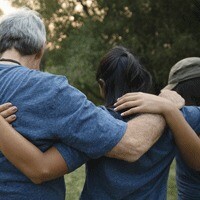The older I get the more I realize life is an interesting journey. It is a journey that will consistently and constantly teach us if we are willing and open to learn in the areas of unconditional love and acceptance. When I was at Ricks College a long time ago, I met and fell in love with an amazing individual, Ivan. We dated until he left on his mission. Then we dated after he returned from his mission and before I left on my mission. After the missions we lost contact with each other. He went to Utah State and I went to Brigham Young University.
Years flew by, and we both moved forward with our lives. Then, almost 30 years later, we reunited during a political meeting. We quickly updated each other on our lives, kids, pathways, etc. Needless to say, as with most of us, the direction we thought our lives would take in those younger years at Ricks College had changed in dramatic, positive ways. Neither Ivan nor I were employed in the political science field, which we both had graduated in. Ivan was working in human resources, and I was in the field of mental health. As we talked, I disclosed to Ivan that the upcoming topic for my next radio program was same-gender attraction in a faith-based community. Ivan found my topic exciting and asked if I would like some guest speakers for my program, noting he had a few in mind.
I of course said, “Yes. That would be great, thank you. Who do you have in mind?”
Without skipping a beat, Ivan said, “Me.”
I am sure that at this point my brain should have paused; but without hesitation, I said, “So it was you at Ricks College, not me! Do you know how madly in love I was with you back then? I could never figure out why the relationship did not progress. I wondered often what the heck was holding us back! Oh, I feel so relieved!”
Ivan smiled and said, “You are the first person to ever respond that way after learning I am gay.”
I smiled, adding, “Oh Ivan, I love you! It does not matter that you are gay. You are my friend!”
Over the next several years, and even today, Ivan and I still share an amazing friendship. Ivan is comfortable talking with me about his struggles, his perspectives on how members of the Church can be more inclusive, what he wants in life, and all that he is striving to do. For example, a few weeks ago he shared with me that one Sunday he was not overly excited about attending elders quorum because the lesson was on how to support your spouse—which he does not have. Ivan then said, “All that needed to change in this lesson title was how to support those who are important in your life. Then I would have considered my kids and felt included and open to attending.”
From Ivan and my clinical practice, I have gained greater insight into the complexities so many face in regards to their sexual identity, and these complexities span beyond such defining letters as LGBTQ. In this process of learning, I have come to realize that at the end of the day, regardless of identified sexuality, what people seek most of all is love and for others to take time to get to know them as individuals, instead of judging them or trying to fix them. They long to be seen in their personal authenticity, to be invited to dinner, to be included in conversations, to feel like they are welcomed in the every-day activities of wards and neighborhoods. They want to be included, just like the rest of us. All of us can help each other in greater capacity through the gospel of Jesus Christ as we are open to sharing and recognizing that life is indeed complicated, intriguing, exciting, lonely, hopeful, stressful, confusing, happy, sad, and that there are no easy answers to many issues.
Ivan and I often talk about the fact that the greatest of all teachers came to those in need of love, understanding, direction, truth, hope, and peace. At the end of the day, if we let Him, He comes to all of us and asks that we open our arms to His sheep.
I wonder how different Sunday worship would be if we all realized that our chapels are not sanctuaries to celebrate those who want to appear perfect but hospitals full of those who are truly seeking direction and purpose in life within in the gospel of Jesus Christ. So many of our brothers and sisters carry the reality that their sexual identity is not heterosexual, but that does not make them bad, strange, weird, crazy, or in need of a cure. It does make them human in a complicated world in which immortal spirits are housed in mortal bodies. As they seek to find their place, what they ask is for kindness, understanding, love, and friends who are open to offer a hug, a handshake, a listening ear, an invitation to dinner, inclusion, and open doors.
There are no simple answers in this world, but there is truth. And the truth is our Savior is there for all of us and all our imperfections. Yes, there are those who come to the sacrament table seeking to understand their sexual identity, and there are those who come with other complexities and challenges. All come to be loved.
Many of my clients, friends, and even colleagues have shared with me that they do now, more than ever before, feel included and wanted in their wards and stakes. Sadly, a few who seek to understand their personal sexual identity and journey have shared with me that they often felt judged, misunderstood, left out, left alone, avoided, and at times the topic of negative conversations. Some have even been asked to leave church meetings. Let us remember, the Savior invited and continues to invite all to come unto Him. My heart mourned as these members have shared their experiences with me.
As we seek to minister in the Lord’s way, it means we seek to minister in love, not judgment. There is a lot we do not understand about human sexuality and its genetic components but this much we do know regardless of how one identifies sexually: what is needed is love and a desire to be understood. Our Savior has set the perfect example in the fact that He met people where they were and gently invited them to come to Him that they might know His truths, His love, and His acceptance.
Here are a few ways we can extend that love and acceptance as well:
1. Recognize and rejoice in our similarities.
First, we can realize that those who identify their sexuality as different than heterosexual are more like those who identify as heterosexual than different. For example, regardless of our sexuality, we all desire to feel included, needed, wanted, listened to, and understood. We all need appropriate human contact, touch, and connection.
2. Take the time to listen.
I make it a point when I see my friends whose sexuality is different than mine to give them a hug, to tell them how much I love and care about them. I take the time to listen to both the joys and challenges in their lives as they take time to listen to mine.
3. Be mindful of LGBTQ brothers and sisters as you prepare lessons.
When I teach a lesson, whether in Sunday School or Relief Society, I am mindful of those who will be in my class, so I strive to direct the lesson in such a way that all may feel included. For example, a lesson entitled “How to love your husband” may exclude those who do not have husbands, whereas the title “How to build Christ-like relationships with those around us” will include all.
4. Extend callings whenever possible.
As leaders of organizations, it is important to invite those who may not be active in the Church at this time or questioning if they want to stay members of the Church as they process through their sexual identity journey to serve in capacities that allow them to feel included without placing undue burden on them.
5. Give love and support, always.
The more I spend time with my friends whose sexualities are different than mine, the more I see our commonalities versus differences. In this commonness, I openly respect their sexual differences, their sexual identity, and appreciate it when they feel comfortable talking with me regarding their personal sexual identity journey. I know I am not in their shoes, but I can love the shoes they currently walk in and offer my support as they walk through a most complex and personal experience.
6. Admit what you don’t know. You don’t need to be an expert. You need to be a friend.
I am upfront about the fact that I may not have very many answers, that I do not fully understand what they are going through, but they know I offer love regardless of what direction they feel their lives need to take. They also know that I will share with them my personal feelings regarding the doctrines of Christ.
7. Try your best. It will be enough.
Often, I think, as members of the Church we let our heads lead instead of our hearts. So many of us long to be supportive but fear we might say the wrong thing or do the wrong thing. I can tell you that trying and asking forgiveness if you say or do the wrong thing is more needed by those who are on their own journey of sexual identity than being silent and turning away. In ministering, love and a desire to make new lifelong friends is needed far more than answers and advice.



